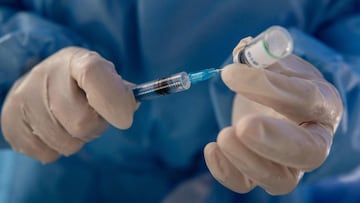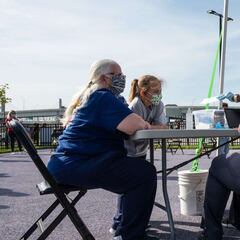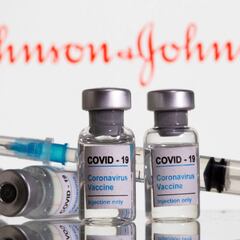Why are there side effects to covid-19 vaccines?
Astra Zeneca, Moderna, Pfizer, Johnson and Johnson... all of the coronavirus vaccines that have been released can potentially cause mild side effects.


Vaccines train your immune systems to recognize a pathogen and prevent infection. When being vaccinated, you may find that you suffer from side effects ranging from fever to headache. This is good news and means the vaccine is working.
In the case of the covid-19 vaccines, your body is receiving pieces of the virus’s genetic code so that in the case you are infected, your immune system can quickly begin to create antibodies.
In the US, three pharmaceutical companies -- Pfizer, Moderna, and Johnson and Johnson -- have had their vaccines approved. These vaccines have demonstrated high efficacy in preventing covid-19 infection but after the poke some patients have reported feeling side effects, which are in almost all cases mild.
- US vaccine news: latest updates
- What is a covid passport?
- How many blood clots have been reported in the US after the vaccine?
- FDA report finds multiple storage failures in a J&J vaccine factory
What side effects may you feel after receiving a covid-19 vaccine?
According to the Center for Disease Control and Prevention (CDC), individuals who have received covid-19 vaccines have reported various symptoms, including tiredness, headache, muscle pain, chills, fever, nausea, and more.
Why is it important to get both doses?
Two of the vaccines currently available, Pfizer and Moderna, require two doses to be administered to protect people against the coronavirus. After the first dose, researchers found that these vaccines may only provoke a mild immune response and could lead someone to develop a more severe case of covid-19. Other studies have shown that one dose may provide a sufficient level of protection to prevent infection in the short term, but the immunity weakens without the second dose. When both doses are administered these vaccines have shown that they are able to provide a strong immune response for a longer period of time.
In the US today, there are about five million people who have gotten one dose and forgone or postponed their second. Part of the hesitancy in receiving the second dose could be because of side effects endured after the first vaccination. While feeling side effects may increase reluctance in getting a second dose, the CDC has released guidance saying that the symptoms should only last a few days. On the other hand, a severe case of covid-19 can lead to hospitalization, long-term health impacts such as organ damage or memory loss, and even death.
If side effects persist beyond a few days, the CDC recommends you call your primary health care provider. Depending on the state of your health, your doctor may advise you to take over-the-counter medications to counteract the symptoms.
How many people in the United States have been vaccinated?
Related stories
As of 27 April, more than 230 million doses have been administered and a little over a quarter of the population are fully vaccinated.
Connecticut has vaccinated the 36.4% of its population, making it the state with the highest percentage of vaccinated residents. Meanwhile, in New Hampshire close to 60% of residents have received at least one dose of a vaccine. Some states trailing the national average include Alabama and Utah where only 21% and 22% of the population are fully vaccinated. Many residents in these states live in rural areas where keeping the Pfizer and Moderna vaccines at below freezing temperatures can pose logistical challenges. As the rollout of the Johnson and Johnson vaccine continues, public health officials hope that these numbers will increase as the temperature needs of this vaccine are not as extreme as the others.
#COVID19 vaccines are now more widely accessible.
— CDC (@CDCgov) April 26, 2021
As of April 26, more than 140 million people in the United States had received at least one dose of COVID-19 vaccine. Of those, more than 95 million are fully vaccinated.
More: https://t.co/zYLe3H12re. pic.twitter.com/aM4RxhKlLz

